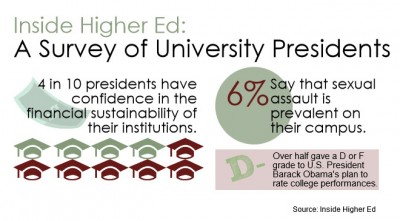
A Friday report by Inside Higher Ed detailed how university presidents are responding to a number of educational challenges, including U.S. President Barack Obama’s proposed college ratings system, financial sustainability, sexual assault on campus and the role of university presidents in faculty tenure and hiring decisions.
The report surveyed university presidents at 647 public and nonprofit institutions.
Boston University spokesman Colin Riley said he did not know whether BU President Robert Brown participated in the survey, but said the report does provide a “snapshot” of what presidents at higher education institutions are thinking.
“It [the survey] is designed to get an answer within a range,” he said. “With politics being involved, that could change. I don’t think these will specifically soon because these issues are at the forefront in politics currently.”
Approximately one-third of college presidents said sexual assault is an issue for schools, but only 6 percent believe it is an issue at their institution, the report stated.
“BU focuses on empowering the individual, making them feel safe, making them aware and understanding the resources available to them,” Riley said. “It’s an awful situation to go through, so if someone makes a complaint that they aren’t safe, we make sure that they immediately get the treatment they need, and we encourage them to do that.”
Maureen Mahoney, director of the Sexual Assault Response and Prevention Center at BU, said the university has programs that cater to individuals through counseling and prevention education.
“The students come to us because we are confidential,” she said. “We help the student understand what his or her options are, and with that, the consequences of each option. “It is the role of the university administration to provide a safe space for students to lean. Even if it is an individual issue, it is a university’s job to ensure its students are comfortable.”
The report stated that approximately 36 percent of presidents at private nonprofit universities gave a “D” grade to Obama’s proposed ratings plan, a program not yet approved by the U.S. Congress that would gage the success and progress of various programs at universities.
Riley said to leaders at universities such as BU, the amount of money and time that it would take institutions to cater to Obama’s new ratings system is a major concern.
“If you take out higher education in this context, and were in the financial services industry, which is going a lot of scrutiny, you might think here there is more regulation that may make it more complicated,” he said. “No matter what industry, there are consequences to what they’re proposing, and that is very common.”
Approximately 22 percent of university presidents surveyed said they strongly agreed that university presidents should “take a more active role” in faculty hiring decisions, the report stated. In addition, 30 percent strongly agree about having more say in which faculty members become tenured.
Several students said they were interested in the key issues brought up in the study.
Dimitri Kyranos, a senior in the College of Arts and Sciences, said private institutions should have the liberty to decide how they participate in Obama’s proposed college ratings system.
“In a private institution, the president of that university always has the right to choose whether they should participate. From a legal aspect, that’s what President Brown has to look at,” he said. “If he wants to work with these revisions Obama wants to make, it’s totally up to his discretion to determine what would be best to excel the school in rankings or in national prominence.”
Guzin Eren, a graduate student in the Graduate School of Arts and Sciences, said she is optimistic about BU’s policies in dealing with social issues.
“We have regulations particularly about sexual assault,” she said. “As far as I know, we’re making progress.”
Correction: In an earlier version of this article, the author misquoted Alexa Mancini regarding her views of sexual assault on campus. Due to the improper circumstances of Mancini’s interview, the quote has been removed from this article.




















































































































